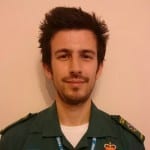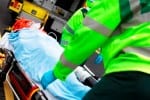 Despina Laparidou, Research Assistant at CaHRU, together with Antony Chuter, a patient representative for Scaling Up PINCER (pharmacist-led information technology intervention for reducing clinically important errors) recently attended the International Society for Quality in Health Care (ISQua) Conference at the Queen Elizabeth II Conference Centre in London (1st – 4th October 2017) and presented the preliminary findings of the Scaling Up PINCER project, funded by the Health Foundation.
Despina Laparidou, Research Assistant at CaHRU, together with Antony Chuter, a patient representative for Scaling Up PINCER (pharmacist-led information technology intervention for reducing clinically important errors) recently attended the International Society for Quality in Health Care (ISQua) Conference at the Queen Elizabeth II Conference Centre in London (1st – 4th October 2017) and presented the preliminary findings of the Scaling Up PINCER project, funded by the Health Foundation.
 The Main Conference offered a combination of exciting plenaries, short oral presentations and longer themed sessions, while poster and e-poster presentations were also presented throughout the duration of the conference. One of the most interesting sessions was the “A Mile in My Shoes”. A Mile in My Shoes is an interactive shoe shop that invited delegates to “(literally) step into someone else’s shoes and embark on a mile-long physical, emotional and imaginative journey to see the world through their eyes”. The session involved listening to, while wearing their shoes at the same time, unique audio stories from people working within health and social care, sharing their experiences and showing the remarkable contribution and challenges faced by those working in, and using, our health and social care system.
The Main Conference offered a combination of exciting plenaries, short oral presentations and longer themed sessions, while poster and e-poster presentations were also presented throughout the duration of the conference. One of the most interesting sessions was the “A Mile in My Shoes”. A Mile in My Shoes is an interactive shoe shop that invited delegates to “(literally) step into someone else’s shoes and embark on a mile-long physical, emotional and imaginative journey to see the world through their eyes”. The session involved listening to, while wearing their shoes at the same time, unique audio stories from people working within health and social care, sharing their experiences and showing the remarkable contribution and challenges faced by those working in, and using, our health and social care system.
 Despina and Antony gave their presentation on the morning of Tuesday 3rd October during a session on “Health Foundation Improving Quality in Community Health Services” and was very well received by the audience. PINCER is a pharmacist-led information technology intervention for reducing clinically important errors in medication management in general practices and the study’s preliminary results show early indications of improvement in most of the study’s safety indicators for gastrointestinal bleed, stroke, heart failure and acute kidney injury, but not for the two asthma indicators. The session, chaired by Will Warburton from The Health Foundation, also showcased studies, such as the “Ophelia Project” on improving health literacy for vulnerable people in the community, and “Making Waves” on Promoting a positive experience for people with COPD.
Despina and Antony gave their presentation on the morning of Tuesday 3rd October during a session on “Health Foundation Improving Quality in Community Health Services” and was very well received by the audience. PINCER is a pharmacist-led information technology intervention for reducing clinically important errors in medication management in general practices and the study’s preliminary results show early indications of improvement in most of the study’s safety indicators for gastrointestinal bleed, stroke, heart failure and acute kidney injury, but not for the two asthma indicators. The session, chaired by Will Warburton from The Health Foundation, also showcased studies, such as the “Ophelia Project” on improving health literacy for vulnerable people in the community, and “Making Waves” on Promoting a positive experience for people with COPD.
The Conference came to an end with Wednesday’s plenary and the promise to meet again in 2018 for an even more exciting ISQua Conference in Malaysia!
By Despina Laparidou












